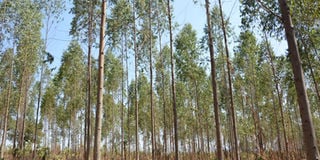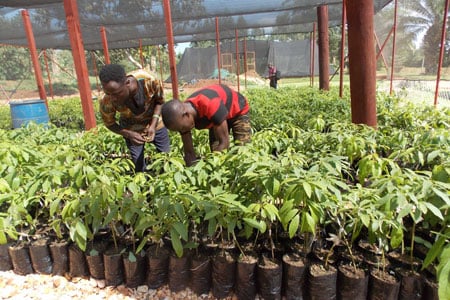Prime
How to invest in agro-forestry sustainably

An eucalyptus tree plantation established by Bangafi in Luweero District. PHOTO | SHABIBAH NAKIRIGYA.
What you need to know:
- He adds that for the electric poles, the initial investment is Shs10.4m. The company plants 890 trees on one acre of land spaced at 7x7ft and after five to six years, there is estimation of a gross income between Shs70m-100m
Tree planting is one of the activities which has been ignored by farmers because its takes long to be harvested and besides that they need big space when you are preparing for cultivation.
Mr Vincent Kasozi, the Chief Executive Officer of Bangafi Agro–Forestry says he started the project of tree planting seven years ago as a personal initiative but when the business expanded he got the idea of planting forests for sale.
“I started this business with one acre of trees especially eucalyptus as my own business but now I have bought several acres of land from different areas across the country for both for myself and clients,” he says
Mr Kasozi adds that he has three categories of plantations including small poles, electric poles and timber poles.
“When we are starting this type of farming we have to purchase land, do research about the soil if it is suitable for forestry, and then process the land tittle before it is handed over to the clients,” he says
How it works
Mr Kasozi says that In the period of seven years since he started this project he has issued land tittles in four phases annually and the expect to start issuing land titles twice a year.
“in a period of three years we have been able to give out 108 land tittles with well grown forest of about 470 acres , this land is located in Bugerere -Kayunga District and Kamira in Nakaseke District,’ he says
Purpose of tree farming
According to Mr Kasozi, he started to harvest and market a two-square miles of mature forest trees and timber every two to three years for small poles which are used to roof the houses and other small structures.
“In this business we also provide clients with titles on private mailo/freehold afforested land with continuous income generation at the same time protecting the endangered forest tree species,” he says.
Mr Kasozi says in this business they are targeting up to 10 commercial timber outlet hotspots and 20 group intermediary supply chain to access local, regional and export market opportunities for small and electric poles and timber products
“We aim at building the capacity of 3,000 clients, local governments’ department focal persons and establish international and local private partnerships, collaborations with target civil society organisatiosn to fully engage and participate in efforts of sustainable forest management & conservation in Uganda,” he says.
He adds that forestry provides employment opportunities in the commercial tree planting agro-forestry plantation programme.
How the business earns
Mr. Kasozi says for small poles, an initial investment of Shs11m is required. Here the company purchases one acre of land with a processed land title on private mailo land and plants 1,742 trees.
After two to three years, it generates a gross income of Shs8.5m and the next harvest can generate a gross income of Shs17m. This is earned continually every after two years with a plough back investment cost of about Shs4m. After the harvest, when it comes to re-planting, a client has to pay half of the current price.
He adds that for the electric poles, the initial investment is Shs10.4m. The company plants 890 trees on one acre of land spaced at 7x7ft and after five to six years, there is estimation of a gross income between Shs70m-100m
For timber poles, he estimates an initial investment is Shs12m where 890 trees are planted on an acre of land. The trees are left to grow for up to 10 years generating a gross income of Shs195m-260m.




